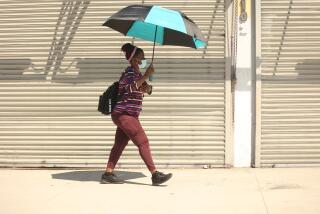Summer Safety Tips
- Share via
Now that summer is here and the temperatures are rising, it’s time to keep in mind the following tips to keep families planning outdoor outings and other activities safe from heat and insects:
Protection From Biting Insects
* Wear a light-colored long-sleeved shirt, long pants and a hat.
* If you are going hiking or camping, secure clothes with rubber bands or tape to prevent insects from getting under them. (Make sure the rubber bands do not constrict your circulation.)
* Avoid underbrush and tall grass when hiking.
* Use an insect repellent and follow directions for use. Be sure to read warnings on the label.
* After being outdoors for a long period, inspect yourself for ticks or have someone else do it. Shower immediately after coming indoors.
* If you have pets that go outdoors, use a repellent made for that type of pet and apply according to label instructions. Check pets often for ticks.
Protection From Extreme Heat
* Know the symptoms of heat disorders and overexposure to sun and be ready to give first aid treatment.
* Install window air conditioners snugly. Insulate spaces around air conditioners for a tighter fit.
* Close any floor heat registers nearby.
* Use a circulating or box fan to spread cool air.
* Keep heat outside and cool air inside by weather-stripping doors and windowsills.
* Install temporary reflectors, such as aluminum-foil-covered cardboard, to reflect any heat back outside.
* Protect windows by hanging shades, draperies, and awnings on windows that receive morning or afternoon sun. Outdoor awnings can reduce heat entering the house by as much as 80%.
During periods of extreme heat be sure to:
* Stay indoors as much as possible. If air conditioning is not available, stay on the lowest floor, away from sunshine.
* Eat well-balanced, light meals.
* Drink plenty of water. (People with epilepsy or heart, kidney or liver disease, who are on fluid-restrictive diets or who have a problem with fluid retention, should consult a doctor before increasing liquid intake.)
* Limit intake of alcoholic beverages that may cause further body dehydration.
* Dress in light-colored, lightweight, loose-fitting clothes that cover as much skin as possible.
* Protect your face and head by wearing a wide-brimmed hat.
* Avoid too much sunshine; it slows the skin’s ability to cool itself. Use a sunscreen with a high SPF (sun protection factor) rating.
* Avoid extreme temperature changes. A cool shower immediately after coming in from hot temperatures can result in hypothermia, particularly for elderly and very young people.
* Slow down. Reduce, eliminate or reschedule strenuous activities to the very early morning hours.
* Take salt tablets only if specified by your physician.
* Vacuum air conditioner filters weekly during periods of high use.
For more information on summer safety, call the Orange County Red Cross at (714) 835-5381, Ext. 100. A complete list of Red Cross health and safety classes offered in Orange County is available as well as vital water safety information.
Source: Orange County Red Cross; Researched by LINN GROVES/For The Times


